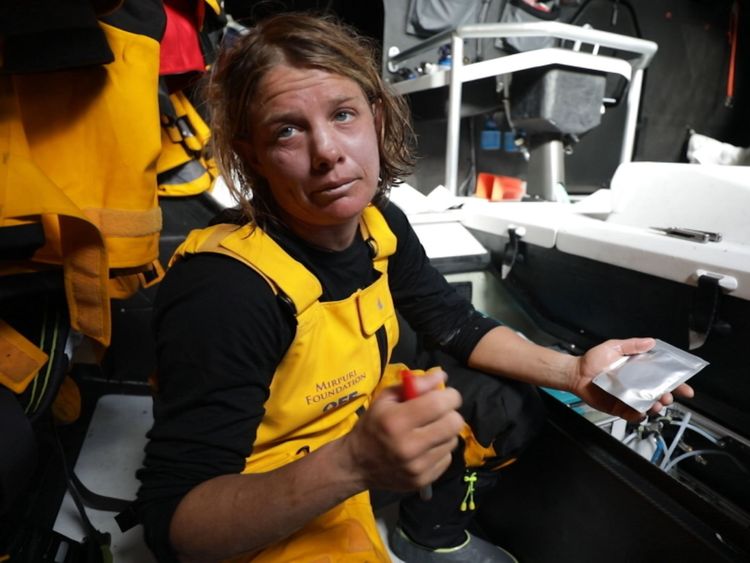Plastic contamination will soon be “catastrophic” for human health and is slowly “killing the human race”, a doctor and environmental organisation have warned.
The stark message comes after research carried out during the Volvo Ocean race proved conclusively that plastic pollution has spread to every part of the planet.
The data was gathered by the yacht Turn The Tide On Plastic, one of seven boats competing in the current edition of the extreme round-the-world sailing event.
Seawater samples collected throughout the 45,000 mile journey are still being analysed, but have revealed traces of microplastics almost everywhere, including in the remotest waters in the Southern Ocean.
The Turn The Tide On Plastic yacht teamed up with Sky Ocean Rescue to campaign for a better understanding over the issue of plastic pollution in our oceans.
The dangers of the open ocean that the crew had to overcome while collecting the samples is brought to life in a new Sky News documentary, Turn The Tide On Plastic – named after the boat.
The Portuguese Mirpuri Foundation, another sponsor of the vessel, told the programme the findings were devastating.
Dr Luiza Mirpuri, the organisation’s medical adviser, said: “It will be catastrophic, not now but in the third generation because each time we have diseases, new diseases from new contaminants.
“We are having more cancer, more allergic diseases, more infertility. We are less fertile than our grandfathers.”
Dr Mirpuri went on to warn that plastic is slowly “killing the human race”.
Other scientists are more measured in their conclusions – but share the same concerns because microplastics are consumed by shellfish which are then eaten by humans.
Dr Malcolm Hudson, environmental scientist at Southampton University, told Sky News: “We actually don’t know the extent of the risk at the moment.
“But […] there will come a point where there will be so much plastic in the ocean that we will be facing hazards that could be endangering human life.”
The team detected 26 particles per cubic metre of seawater even in the remotest parts of the Southern Ocean, hundreds of miles from land. Here you can be closer to the crew of the international space station than anyone on Earth.
Dr Toste Tanhua, chemical oceanographer at GEOMAR – Helmholtz Centre for Ocean Research – who oversaw the science programme, said the findings “tell us that microplastics are everywhere”.
The highest readings were recorded close to big population centres. They found 307 particles in the western Mediterranean at the beginning of the race and the highest yet was in the South China Sea close to Hong Kong, where they found 349 particles.
The sailor who carried out most of the tests, hopes the findings will indeed turn the tide on plastic.
“I’m proud to be part of it,” said Liz Wardley, crew member on Turn The Tide On Plastic. “Especially when we get the results back.
“I’m saddened by the results but at the same time it’s because of us that they have them. And that’s a great achievement.”
The Volvo Ocean race ends in The Hague this week, but this research could be a watershed moment in efforts to clean up the world’s oceans.
:: Sky’s Ocean Rescue campaign encourages people to reduce their single-use plastics. You can find out more about the campaign and how to get involved at www.skyoceanrescue.com
:: And you can watch our documentary Turn The Tide On Plastic at 8.30pm on Tuesday 26 June on Sky Atlantic and 8.30pm on Wednesday 27 June on Sky News.
From – SkyNews


